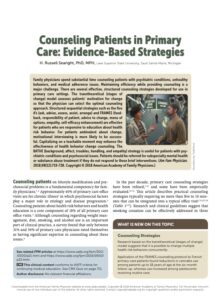 Family physicians spend substantial time counseling patients with psychiatric conditions, unhealthy behaviors, and medical adherence issues. Maintaining efficiency while providing counseling is a major challenge. There are several effective, structured counseling strategies developed for use in primary care settings. The transtheoretical (stages of change) model assesses patients’ motivation for change so that the physician can select the optimal counseling approach. Structured sequential strategies such as the five A’s (ask, advise, assess, assist, arrange) and FRAMES (feedback, responsibility of patient, advice to change, menu of options, empathy, self-efficacy enhancement) are effective for patients who are responsive to education about health risk behavior.
Family physicians spend substantial time counseling patients with psychiatric conditions, unhealthy behaviors, and medical adherence issues. Maintaining efficiency while providing counseling is a major challenge. There are several effective, structured counseling strategies developed for use in primary care settings. The transtheoretical (stages of change) model assesses patients’ motivation for change so that the physician can select the optimal counseling approach. Structured sequential strategies such as the five A’s (ask, advise, assess, assist, arrange) and FRAMES (feedback, responsibility of patient, advice to change, menu of options, empathy, self-efficacy enhancement) are effective for patients who are responsive to education about health risk behavior.
For patients ambivalent about change, motivational interviewing is more likely to be successful. Capitalizing on a teachable moment may enhance the effectiveness of health behavior change counseling. The BATHE (background, affect, troubles, handling, and empathy) strategy is useful for patients with psychiatric conditions and psychosocial issues. Patients should be referred for subspecialty mental health or substance abuse treatment if they do not respond to these brief interventions.
